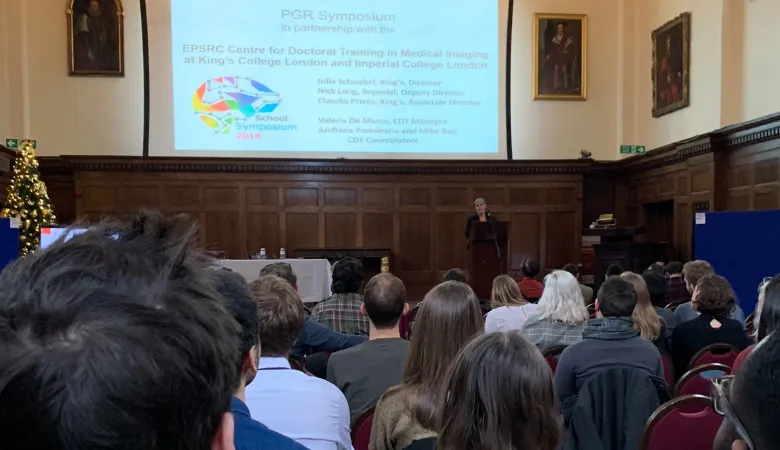19 December 2018
School of Biomedical Engineering and Imaging Sciences Post Graduate Research Symposium
On Friday 14th December we held our annual Postgraduate Research Symposium in association with the King’s-Imperial Centre for Doctoral Training in Medical Imaging

Fully organised by a committee of PhD students and designed to showcase the latest research activity and hear from sector leaders, the event began with lunch and the first poster session. Highlights included new ways of applying existing imaging tools, such as the use of ultrasound for neuroimaging, and chemical tracers with longer half-lives which could open up new possibilities for cancer therapy.
The presentations of the day were kicked off with a video welcome from the Head of School, Prof Seb Ourselin, and a presentation from the CDT Director, Prof Julia Schnabel. Julia highlighted the importance of our longstanding collaborations with Imperial and encouraged PhD students from across the School to align with the Centre to access benefits such as skills training, specialist modules and summer schools.
Professor Prashant Jha, Head of Affordable Technologies, delivered the first keynote talk of the day which explored his decade of expertise in delivering frugal innovation. The concept here is to create low-cost, high impact medical technologies by setting very strict financial constraints against clinical challenges to stimulate creative design ideas.
The stage was then handed over to the first round of student presentations, where 5 researchers delivered insightful talks on imaging myocardial scar tissue, the role of hyaluronic acid in the brain for cancer metastasis, machine learning for coronary x-ray angiography images, software for improved imaging of atrial fibrosis and non-invasive tracking for cardia output monitoring.
The second poster session of the day, covered the latest research on fluorescent imaging, 3D cardiac MRI data, and the use of nanomedicines in PET imaging. Talks in the second round of student presentations covered new methods of achieving high resolution diffusion imaging for precision diagnostics, new labelling for prostate cancer radiotracers and machine learning for the characterization of pulmonary nodules to enable earlier diagnostics through CT.
The importance of public engagement was then highlighted in the Outreach Group session which showcased recent activity including sessions at local schools and the Royal Society Summer Science Exhibition and the engagement outcomes these achieved. For more guidance and advice on public engagement our School has a dedicated support team.
The second keynote of the day, Nadine Haram, regretfully couldn’t attend the event due to a surgery which overran. However, Dr Peter MacNeal another representative from Proximie, was able to stand in and give the audience an overview of the company’s surgical software platform which utilises augmented reality to allow experts to visually and practically interact with surgeries remotely.
Finally, the awards of the day were announced. Many congratulations to:
- Best Oral prize: Laura Stennett & Vassilis Baltatzis
- Best Poster prize: Peter Gawne & Daniel West
- Best MRes Student Prize: Jonathan Jackson
Organising the event takes significant planning, coordination and dedication. A special thank you to Michelle Ma, PGR Coordinator and this year’s committee: Ines Costa, Alex Rigby, Matt Farleigh, George Firth, Aishwarya Mishra, Jessica Jackson, Elsa-Marie Otoo, David Leitao, Federico Luzi, Shu Wang, Yimin Luo, Azalea Khan, Antonia Pontiki, Elisa Roccia and Ingebjorg Hungnes.
The symposium was co-sponsored by the School of Biomedical Engineering and the King’s-Imperial Centre for Doctoral Training in Medical Imaging.
